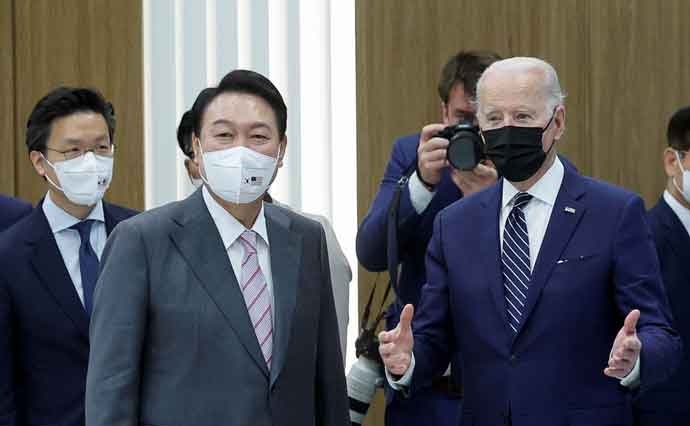Li Liangdong, Commentator based in Beijing, Founder and President of Red Bird Media
Jun 07, 2022
A nation that seeks to maximize its own interests through containment, confrontation, closure, exclusivity or even the use of force runs against the will of the world, and Blinken failed to break that old mold. His words remain out of step with the direction of mankind.
Wang Fudong, Assistant Research Fellow, Institute of International Economics and Politics, Shandong Academy of Social Sciences
Jun 02, 2022
Heightened U.S. military deployments on the Korean Peninsula will only exacerbate the regional security dilemma that affects China, Russia and the DPRK. Meanwhile, exclusivity between the United States and ROK in some trade sectors will be hard to pull off.
Chen Jimin, Guest Researcher, Center for Peace and Development Studies, China Association for International Friendly Contact
Jun 02, 2022
The United States does not rule out cooperation with China on particular issues, but the prominence of cooperation in principle has dropped significantly. Indications are that areas of possible cooperation are narrowing and the difficulty is increasing.
Zhang Yun, Professor, School of International Relations, Nanjing University
May 31, 2022
Thirteen countries in the Indo-Pacific region have joined the initiative, which indicates interest. But there are problems with the framework as presented that raise questions about its ability to succeed and endure.
Shen Dingli, Professor, Institute of International Studies, Fudan University
May 31, 2022
There was nothing new revealed in the U.S. president’s visit, other than launching Indo-Pacific Economic Framework. Roping in Japan and South Korea and declaring that the U.S. would “intervene” in a Taiwan conflict, all amounted to old news.
Liu Chang, Assistant Research Fellow, Department for American Studies, CIIS
May 30, 2022
Lacking concrete detail, the framework is burdened by great uncertainty. Moreover, the United States seems to be sending a decoupling signal to China — a questionable strategy. If the U.S. continues along this line, it will be hard to win confidence and cooperation from countries in the Indo-Pacific region.
Tang Xinhua, Associate Researcher, Tsinghua University’s Institute of International Relations
May 30, 2022
The goal of the United States in creating the IPEF is to gain an asymmetric technological advantage over China and to create an environment for long-term competition. It wants a new rules-based Indo-Pacific order forged in its own image.
Tao Wenzhao, Honorary Member of the Chinese Academy of Social Sciences; Fellow, CASS Institute of American Studies
May 30, 2022
The IPEF as yet has no real content, so people are understandably mystified. America wants to drive a wedge between regional countries and China. But this won’t work, as China is already embedded. Supply chains will not be altered on a whim.
Lucio Blanco Pitlo III, President of Philippine Association for Chinese Studies, and Research Fellow at Asia-Pacific Pathways to Progress Foundation
May 26, 2022
India and Pakistan share a deeply intertwined and embattled history. And now that India sees China entering the picture to back Pakistani development, the thought of two neighboring rivals growing closer has put India on notice.

Zhao Minghao, Professor, Institute of International Studies at Fudan University, and China Forum Expert
May 24, 2022
Washington is looking to shore up its Indo-Pacific strategy by further roping in South Korea and Japan. Its strategy is alive and well despite the Russia-Ukraine conflict, and China’s peripheral diplomacy will continue to face thorny challenges.
Back to Top

- China-US Focus builds trust and understanding between the U.S. and China through open dialogue among thought leaders.
- Our Offerings
- Topics
- Videos
- Podcasts
- Columnists
- Research Reports
- Focus Digest
- Stay Connected
-
Thanks for signing up!
- Get the latest stories from China-US Focus weekly.